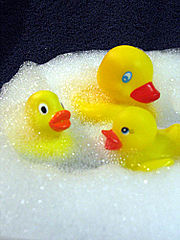The idea of daylight savings time was first toyed with by
Benjamin Franklin in 1784, however, the modern idea of it comes from
George Vernon Hudson who proposed this in 1895. Ultimately, it took effect during the First World War in Germany, ultimately being adopted during peace-time in the United States starting around 1966. Its purpose is to extend the amount of daylight during the evening time, and to shorten the daylight in the mornings.
For its entire history, daylight savings time has been a contentious issue around the world, being defeated and adopted by various governments, territories and regions.
No matter who you are, the changing of the clocks will affect your sleep schedule. To minimize this impact we change the clocks on a Sunday morning, but for many of us the effects of the change can affect us for weeks.
This week, my post is about tricks and tips I have learned for adjusting your body’s sleep schedule, and hopefully regaining some sort of balance to your internal clock. Having been a long sufferer of insomnia I do have quite a bit of experience in getting myself into bed.
Preparing for Sleep
This may sound simple and unscientific, however if you start preparing for sleep in advance, your body starts to get ready to go to sleep. This will include winding down your activities, maybe putting on your pyjamas, doing some reading and/or listening to some music. Everyone has their own ritual in how they prepare for sleep, and if you start this at say 10pm each evening (work and school permitting), you should be able to get yourself in the mood for slumber within a couple of hours.
 Beverage and Food
Beverage and Food
There are many beverages and foods out there that will have a significant impact on our ability to go to, and stay asleep. When you know bedtime is approaching, some simple guidelines should aide you in your ultimate goal. This will of course mean limiting (or eliminating) caffeine products such as cola, coffee or chocolate, as this will stimulate you to stay awake. Further, try to avoid heavy meals near bedtime; this is not only good to ensure a good night’s sleep, but your waistline will thank you for it as well. If you want something to drink before bed, stick with water or herbal tea. Chamomile tea is a natural sedative and will help you get to sleep.
 The Bubble Bath
The Bubble Bath
I know some people dislike the idea of taking a bath, as you are basically sitting in your own filth, however if you take a quick shower and then add some suds to the tub you are in for a very relaxing treat. Extend the tranquility by lighting some candles and maybe burning some incense or some sort of aromatherapy. Then, all you need to do is lie back and relax in the warm water.

For the best results, I recommend combining the tips from above. I will start winding down my day as bedtime approaches and grab a chamomile tea and set off for the tub. I have been doing a pretty good job with my sleep habits for a few years now, and I hope that this post will help you out as well.
Finally, I just want to tell you that if you are not ready to go to sleep, don’t go to bed. There is nothing worse than tossing and turning all night because you went when you weren’t sleepy. If you are not ready for bed read a book or something that you know can make you tired.
If you have suggestions of your own or comments on mine, please fill out my comment section below.
Until next time, happy slumbers.
-Jon
 Beverage and Food
There are many beverages and foods out there that will have a significant impact on our ability to go to, and stay asleep. When you know bedtime is approaching, some simple guidelines should aide you in your ultimate goal. This will of course mean limiting (or eliminating) caffeine products such as cola, coffee or chocolate, as this will stimulate you to stay awake. Further, try to avoid heavy meals near bedtime; this is not only good to ensure a good night’s sleep, but your waistline will thank you for it as well. If you want something to drink before bed, stick with water or herbal tea. Chamomile tea is a natural sedative and will help you get to sleep.
Beverage and Food
There are many beverages and foods out there that will have a significant impact on our ability to go to, and stay asleep. When you know bedtime is approaching, some simple guidelines should aide you in your ultimate goal. This will of course mean limiting (or eliminating) caffeine products such as cola, coffee or chocolate, as this will stimulate you to stay awake. Further, try to avoid heavy meals near bedtime; this is not only good to ensure a good night’s sleep, but your waistline will thank you for it as well. If you want something to drink before bed, stick with water or herbal tea. Chamomile tea is a natural sedative and will help you get to sleep.
 The Bubble Bath
I know some people dislike the idea of taking a bath, as you are basically sitting in your own filth, however if you take a quick shower and then add some suds to the tub you are in for a very relaxing treat. Extend the tranquility by lighting some candles and maybe burning some incense or some sort of aromatherapy. Then, all you need to do is lie back and relax in the warm water.
The Bubble Bath
I know some people dislike the idea of taking a bath, as you are basically sitting in your own filth, however if you take a quick shower and then add some suds to the tub you are in for a very relaxing treat. Extend the tranquility by lighting some candles and maybe burning some incense or some sort of aromatherapy. Then, all you need to do is lie back and relax in the warm water.
 For the best results, I recommend combining the tips from above. I will start winding down my day as bedtime approaches and grab a chamomile tea and set off for the tub. I have been doing a pretty good job with my sleep habits for a few years now, and I hope that this post will help you out as well.
Finally, I just want to tell you that if you are not ready to go to sleep, don’t go to bed. There is nothing worse than tossing and turning all night because you went when you weren’t sleepy. If you are not ready for bed read a book or something that you know can make you tired.
If you have suggestions of your own or comments on mine, please fill out my comment section below.
Until next time, happy slumbers.
-Jon
For the best results, I recommend combining the tips from above. I will start winding down my day as bedtime approaches and grab a chamomile tea and set off for the tub. I have been doing a pretty good job with my sleep habits for a few years now, and I hope that this post will help you out as well.
Finally, I just want to tell you that if you are not ready to go to sleep, don’t go to bed. There is nothing worse than tossing and turning all night because you went when you weren’t sleepy. If you are not ready for bed read a book or something that you know can make you tired.
If you have suggestions of your own or comments on mine, please fill out my comment section below.
Until next time, happy slumbers.
-Jon
0 comments on “It’s Time for a Change”